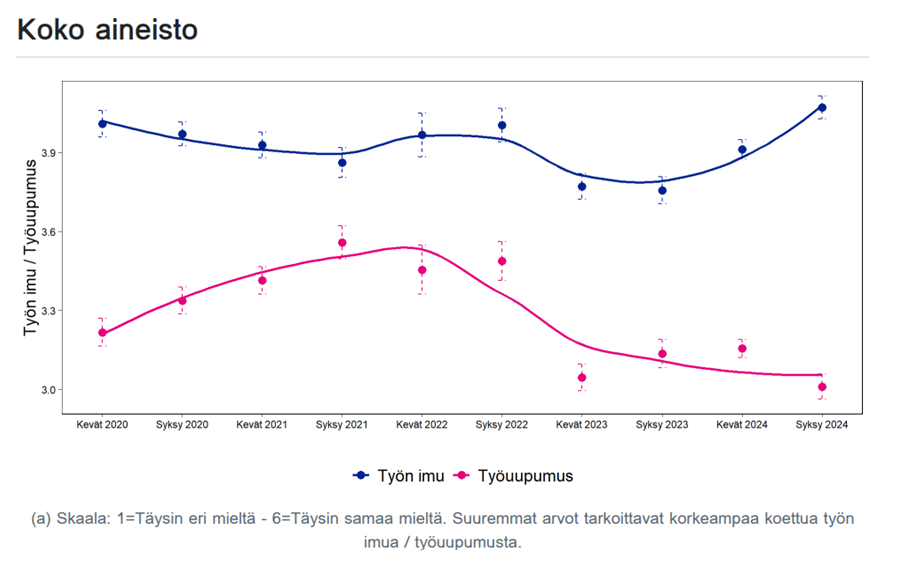Teachers’ occupational wellbeing improved
The Teachers' Occupational Wellbeing Study is a biannual follow-up study targeting teachers across Finland at all levels of education. It examines occupational wellbeing in the profession and relevant factors through a comprehensive questionnaire. The latest survey, conducted in autumn 2024, attracted a record number of over 1,800 respondents.
“Such a large number of respondents already provides a fairly reliable overview of the trend in teachers’ occupational wellbeing. The same positive trend was also evident in the Principal Barometer survey published in the beginning of the year,” says Academy Professor Katariina Salmela-Aro from the University of Helsinki, who heads two research groups focused on occupational wellbeing among school leaders and teachers.
Decline in burnout began earlier
In the follow-up study, two key factors are used to describe occupational wellbeing: perceived work engagement and burnout. The survey illustrates the effects of the beginning of the coronavirus pandemic on teachers’ coping at work. After growing significantly in 2020 and 2021, the burnout experienced by teachers has since been in decline. In contrast, work engagement started to improve significantly only last year. The trend was similar across the country and at all levels of education.
Work engagement is a state associated with occupational wellbeing, characterised by energy, dedication and absorption in work.
“Among other things, it is promoted by the fact that work-related resources, such as effective leadership, inclusivity and the opportunity to influence your work, offset work-related requirements. These include high workloads, time pressure and role-related conflicts,” says University Lecturer Lauri Hietajärvi from the University of Helsinki, explaining the findings.
“Besides work engagement and burnout, the study investigates other key factors associated with occupational wellbeing, such as teachers’ competence, relatedness, and autonomy at work. These are basic psychological needs central to experiencing engagement in work,” Hietajärvi adds.
“It appears that teachers have been better able to concentrate on the basics, as perceived ‘illegitimate tasks’ have decreased. These include tasks considered unnecessary to your work or unreasonable in relation to your job description. Experiences of the meaningfulness of work have also increased among the profession.”
Teachers consider autonomy important
However, factors threatening the autonomy of work are evident, as related frustration has been markedly elevated compared with other basic psychological needs in each survey. In Finland, teachers are highly educated professionals who have traditionally been trusted as highly autonomous.
Postdoctoral Researcher Olli-Pekka Heinimäki at the University of Helsinki considers it important to closely monitor experiences of autonomy in future surveys.
“Autonomy is an important part of teachers’ professional identity and occupational wellbeing, making it an important factor for the retention and attraction of teachers within the profession.”
In spite of a positive overview, intentions to leave the profession are common among teachers. As many as over half (55%) of the respondents to the latest survey have considered leaving the teaching profession and seeking employment in another field. Only a little over one-third have not considered changing careers or exiting the profession. The trend has been the same in each survey.
“A considerably smaller share actually change careers, but from the perspective of professional development and wellbeing, working ‘with one foot in the door’ does not look good, and the attraction of the teaching profession should indeed be improved,” says Heinimäki.
Follow-up continues as a longitudinal study
So far, the data collected every six months have made it possible to follow general trends in a cross-sectional manner. In the future, some teachers will also be followed longitudinally.
“This way, we will get an even more in-depth look at the trends in occupational wellbeing specific to, for example, individuals, educational institutions and regions, as well as at the factors at different levels affecting them,” says Hietajärvi.
The teachers’ occupational wellbeing survey is part of the EDUCA (Education for the Future) Flagship funded by the Research Council of Finland, promoting education development based on research and supporting knowledge-based leadership. The Flagship focus areas include strengthening the skills of teachers and education leaders. The University of Helsinki is responsible for the biannual teachers’ occupational wellbeing survey. The survey data were collected in close cooperation with the Trade Union of Education in Finland OAJ, whose members’ responses constitute the dataset.
Up-to-date summary of key research findings (in Finnish only)


